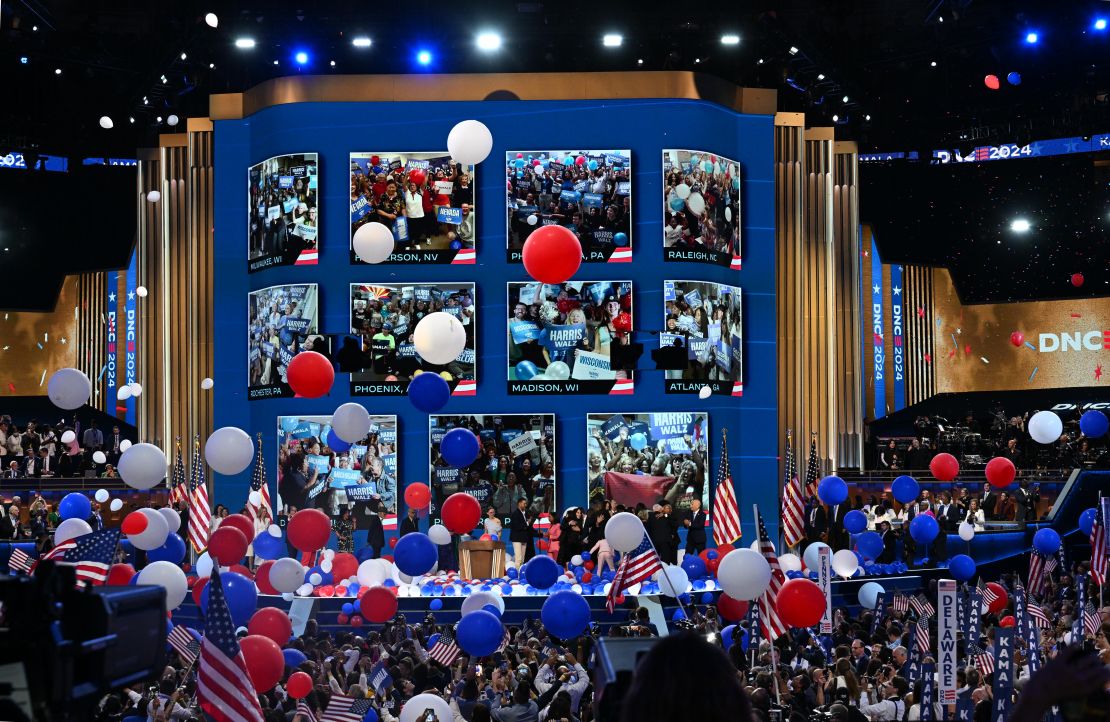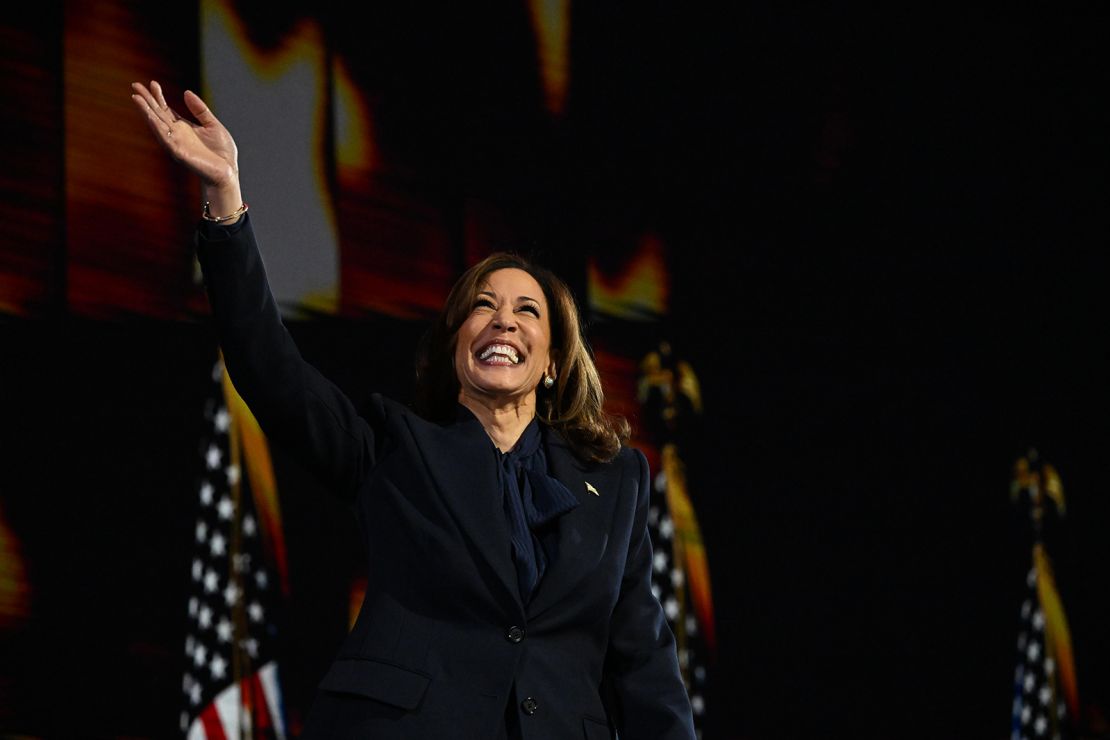Vice President Kamala Harris capped one of the most extraordinary months in modern political history Thursday night with a speech that rallied Democrats around themes of patriotism — and cast Donald Trump as the enemy of classic American principles.
“In the enduring struggle between democracy and tyranny, I know where I stand. And I know where the United States belongs,” she said.
With the cadence of a courtroom prosecutor, Harris delivered on the promise many Democrats saw in her when she launched her first presidential campaign five years ago, and when Joe Biden chose her as his running mate in 2020.
Harris went directly at her Republican rival. She laid out the former president’s legal troubles. She blamed him for the horrors some women have faced amid the implementation of strict state-level abortion laws. She issued a reminder of what she called the “chaos and calamity when he was in office.”
‘Out of their minds’: Kamala Harris goes after Trump and GOP on abortion
“In many ways, Donald Trump is an unserious man,” she said. “But the consequences of putting Donald Trump back in the White House are extremely serious.”
Harris also delved deeper into her own policy positions, particularly on foreign policy. She said she’d be a president who is “realistic, practical and has common sense” — a clear rebuttal to Trump’s effort to brand her as too liberal.
The differences between Harris’ speech in Chicago and the one Trump delivered last month at the Republican convention in Milwaukee could not have been more stark — and set the stage for the sprint to the November 5 election, with head-to-head confrontations in debates yet to come.
Here are eight takeaways from the fourth and final night of the Democratic National Convention:
Harris delivered a simple message to Americans: You don’t have to live like this anymore.
At times explicitly and always written into the subtext of her remarks, Harris offered voters a clean break from the Trump era and its grinding uncertainty and political upheaval.
“We are not going back,” Harris said, repeatedly, as she and others – including the chanting thousands inside the United Center – have done since she became the presumptive nominee. But as much as the slogan is a rebuke of Trump’s policies and a promise of progressive change, it also resonates more narrowly as an assurance for the immediate term.
To “not go back” to even a few weeks ago, before her campaign took flight.
Harris’ campaign has also talked at great length about “freedom,” seeking to reframe issues such as reproductive rights as a question of government interference.

At stake in the election, Harris said, were “the freedom to live safe from gun violence, in our schools, communities, and places of worship; the freedom to love who you love openly and with pride; the freedom to breathe clean air, drink clean water, and live free from the pollution that fuels the climate crisis; and the freedom that unlocks all the others: The freedom to vote.”
On this night, though, it was hard not to also hear the offer of “freedom” from the anger and divisions, both fundamental and petty, that have defined much of the past decade of American life.
Harris has long struggled to open up about her personal story. Not anymore.
Over the course of her short campaign, she has talked more about her mother, about her childhood growing up middle class, the daughter of two immigrants and academics, and her journey into political office.
On Thursday, Harris talked about how her father, economist Donald Harris, encouraged her to run free on the playground when her mother cautioned her to be careful. She told the audience about her late mother, Shyamala Gopalan Harris, a biomedical scientist who wanted to cure breast cancer and raised her two daughters after her divorce. And she talked about the tight-knit community that helped raise her and her sister, Maya.

“My mother was a brilliant, five foot tall, brown woman with an accent, and as the eldest child, I saw how the world would sometimes treat her,” Harris said. “But my mother never lost her cool.”
The vice president didn’t explicitly compare her upbringing with the former president’s, but other speakers this week have made a more direct contrast between her childhood and Trump’s life as the son of a real estate mogul.
Harris again recalled a childhood experience that helped shape her career path. In high school, her friend Wanda Kagan confided in Harris that she was being sexually abused by her stepfather, Harris said that her friend should stay with her family.
“This is one of the reasons I became a prosecutor, to protect people like Wanda,” she said.
Throughout her 2020 presidential campaign, Harris sought to escape the label that she was a “cop” and out of step with the left on criminal justice reform issues. But as she’s sought to introduce herself to the public as a presidential candidate, she’s leaned into her resume as a strength. Each night has highlighted her work fighting transnational gangs, sexual abusers and corporate bad actors.
Several of her former colleagues, from her time in the Alameda County district attorney’s office to her years as California attorney general, appeared Thursday night to make the case that she approached her job with compassion and grit.
“For Kamala, practicing law was always about protecting the vulnerable and giving the victims a voice,” said Amy Resner, a former deputy district attorney for Alameda County and a longtime friend.
Lisa Madigan, the former attorney general of Illinois, spoke about working with Harris during the financial crisis to prevent families from being foreclosed upon. Nathan Hornes, a former student at Corinthian Colleges, a defunct for-profit school, addressed her successful effort to prosecute the school for defrauding students.
One of the most striking testimonies came from Courtney Baldwin, a youth organizer and human trafficking survivor, who spoke of how Harris worked to shut down the website that traffickers used to force her and others into sex work.
“She’s protected people like me her whole life,” Baldwin said.
Trump and many other Republicans for years have made a show out of mispronouncing Harris’ first name.
Thursday night, Harris’ two young grandnieces, Amara and Leela Ajagu — with an assist from actress Kerry Washington — appeared onstage to send a message: It’s so easy that children can do it.
“First you say comma, like a comma in a sentence,” Amara said.
“Then you said la, like la, la, la, la, la,” Leela added in a sing-song voice.

Kamala Harris’ grandnieces teach DNC crowd how to pronounce her name
Several Harris family members followed.
Amara and Leela’s mother, Harris’ niece Meena Harris, said that the vice president “guided me; now she’s guiding my own children.” Harris’ stepdaughter, Ella Emhoff, said that when the two met when she was 14, Harris “was patient, caring and always took me seriously.”
“She taught me that making a difference means giving your whole heart and taking action,” said Harris’ goddaughter, Helena Hudlin.
Later, Maya Harris, the vice president’s sister, talked about their mother, who died in 2009.
“I so wish that Mommy could be here tonight,” she said. “I could just see her smiling, saying how proud she is of Kamala. And then, without missing a beat, she’d say, ‘That’s enough, you’ve got work to do.’”
Even before Biden ended his reelection campaign, Harris was a leading voice in the administration on gun control. Thursday night cemented that, as the convention highlighted the personal stories of people affected by gun violence – from mass shootings to murders at the hand of abusive partners.

Americans impacted by gun violence speak at DNC
















